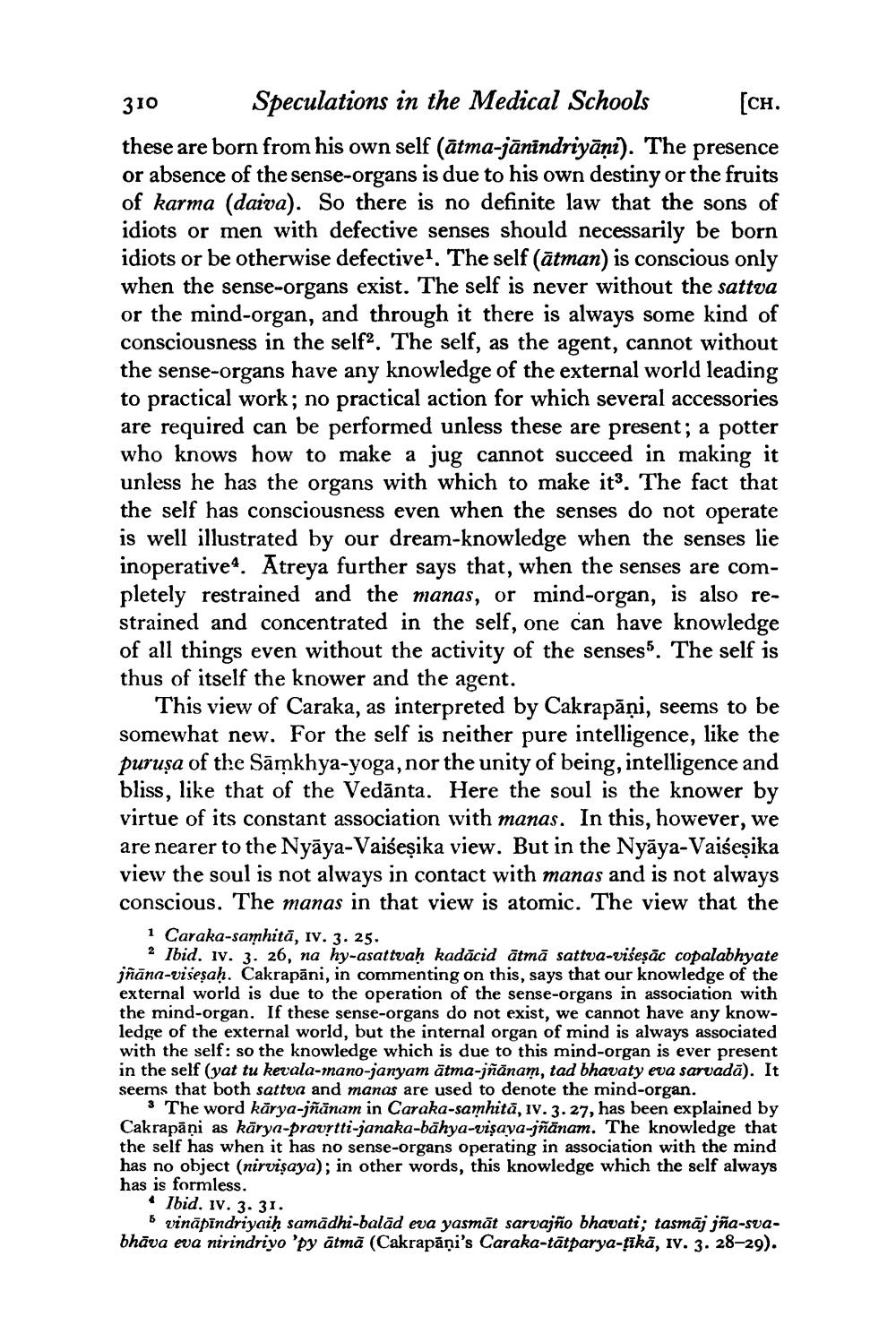________________
310
Speculations in the Medical Schools
[CH.
these are born from his own self (ātma-jānīndriyāņi). The presence or absence of the sense-organs is due to his own destiny or the fruits of karma (daiva). So there is no definite law that the sons of idiots or men with defective senses should necessarily be born idiots or be otherwise defective1. The self (atman) is conscious only when the sense-organs exist. The self is never without the sattva or the mind-organ, and through it there is always some kind of consciousness in the self2. The self, as the agent, cannot without the sense-organs have any knowledge of the external world leading to practical work; no practical action for which several accessories are required can be performed unless these are present; a potter who knows how to make a jug cannot succeed in making it unless he has the organs with which to make it3. The fact that the self has consciousness even when the senses do not operate is well illustrated by our dream-knowledge when the senses lie inoperative. Atreya further says that, when the senses are completely restrained and the manas, or mind-organ, is also restrained and concentrated in the self, one can have knowledge of all things even without the activity of the senses". The self is thus of itself the knower and the agent.
This view of Caraka, as interpreted by Cakrapāņi, seems to be somewhat new. For the self is neither pure intelligence, like the puruşa of the Samkhya-yoga, nor the unity of being, intelligence and bliss, like that of the Vedanta. Here the soul is the knower by virtue of its constant association with manas. In this, however, we are nearer to the Nyaya-Vaiśeṣika view. But in the Nyaya-Vaiśeṣika view the soul is not always in contact with manas and is not always conscious. The manas in that view is atomic. The view that the
1 Caraka-samhita, IV. 3. 25.
2 Ibid. IV. 3. 26, na hy-asattvaḥ kadācid ātmā sattva-viseṣāc copalabhyate jñāna-viseṣaḥ. Cakrapani, in commenting on this, says that our knowledge of the external world is due to the operation of the sense-organs in association with the mind-organ. If these sense-organs do not exist, we cannot have any knowledge of the external world, but the internal organ of mind is always associated with the self: so the knowledge which is due to this mind-organ is ever present in the self (yat tu kevala-mano-janyam ātma-jñānam, tad bhavaty eva sarvadā). It seems that both sattva and manas are used to denote the mind-organ.
The word karya-jñānam in Caraka-samhita, IV. 3. 27, has been explained by Cakrapāņi as kārya-pravṛtti-janaka-bahya-viṣaya-jñānam. The knowledge that the self has when it has no sense-organs operating in association with the mind has no object (nirvisaya); in other words, this knowledge which the self always has is formless.
Ibid. IV. 3. 31.
5 vinapindriyaiḥ samādhi-balād eva yasmāt sarvajño bhavati; tasmāj jña-svabhava eva nirindriyo 'py atma (Cakrapāņi's Caraka-tātparya-ṭīkā, IV. 3. 28-29).




